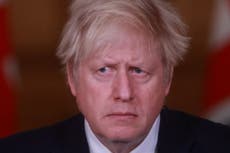Former Tory MP picked to lead universities’ watchdog will keep party whip in House of Lords
James Wharton’s appointment to Office for Students follows protest that panel was ‘packed’ with Conservative allies
Your support helps us to tell the story
From reproductive rights to climate change to Big Tech, The Independent is on the ground when the story is developing. Whether it's investigating the financials of Elon Musk's pro-Trump PAC or producing our latest documentary, 'The A Word', which shines a light on the American women fighting for reproductive rights, we know how important it is to parse out the facts from the messaging.
At such a critical moment in US history, we need reporters on the ground. Your donation allows us to keep sending journalists to speak to both sides of the story.
The Independent is trusted by Americans across the entire political spectrum. And unlike many other quality news outlets, we choose not to lock Americans out of our reporting and analysis with paywalls. We believe quality journalism should be available to everyone, paid for by those who can afford it.
Your support makes all the difference.The proposed head of the watchdog for universities – who was Boris Johnson’s leadership campaign manager – says he plans to keep the Tory whip in the House of Lords.
James Wharton faced tough questions from MPs about his “independence” if he is confirmed as the new chair of the Office for Students (OfS), after a protest that the appointment panel was rigged.
The former MP for Stockton South, who was handed a peerage by the prime minister last August, admitted he had no direct experience in higher education – which was “hopefully a good thing”.
And, asked if he would relinquish his party allegiance in the Lords, he insisted he could negotiate a deal with Tory whips to speak out when necessary.
“They will give me more latitude and understand that I may need to vote against, or speak against, some of the things the party in government could bring forward,” Lord Wharton told the Commons education committee.
He argued the Lords was a more “independent” chamber than the Commons, telling the MPs: “I don’t think that is going to be a problem.”
And, on his role as Mr Johnson’s campaign chief in 2017, Lord Wharton insisted: “I don’t see how that brings me into conflict.”
The OfS is the regulator of higher education in England – to “make sure that students succeed” – and describes its role as championing equality and diversity.
Last November, the commissioner for public appointments, Peter Riddell, attacked the government “packing” of the five-strong recruitment panel for the role with the aim to “appoint their allies”.
It included one Tory peer, one former Tory MP, another former Tory candidate and Nick Timothy, Theresa May’s former chief-of-staff.
The government was once criticised for spending £40,000 of taxpayers’ money trying to disguise how little Mr Wharton had visited the north of England in his role as so-called ‘Northern Powerhouse’ minister.
Under questioning, Lord Wharton struggled to give an example of how he might criticise policy, but pledged to be “independent and vocal”, adding: “If that brings me into conflict with the government, so be it.”
During the evidence session, the peer:
* Rejected the Labour target for 50 per cent of young people to go into higher education – which the government has already dumped – as “arbitrary and blunt”.
* Criticised the “horrific conditions” some overseas students are currently living in – saying “some have been let down”.
* Declined to back the National Union of Students ‘Students Deserve Better’ campaign – but said he had a “full regard for the role they play”.
* Attacked universities which have criticised the International Holocaust Remembrance Alliance definition of antisemitism as unsuitable for higher education – saying: “I don’t understand why any university has not adopted it.”





Join our commenting forum
Join thought-provoking conversations, follow other Independent readers and see their replies
0Comments